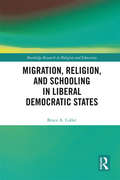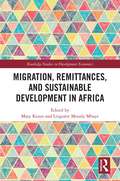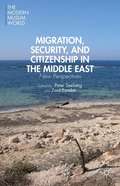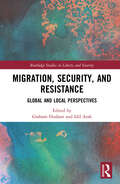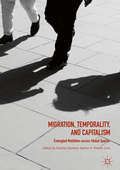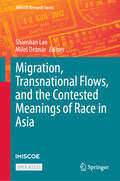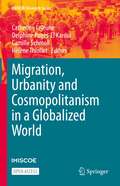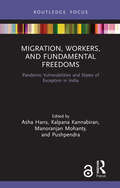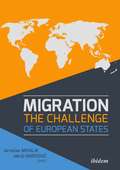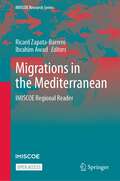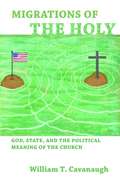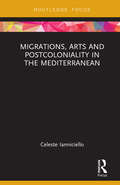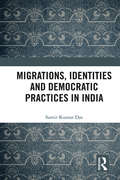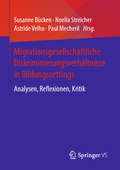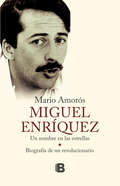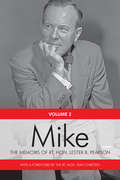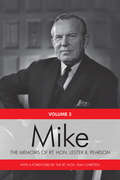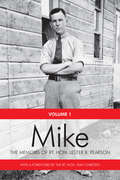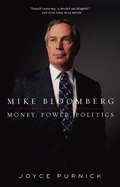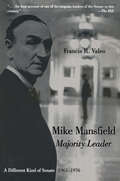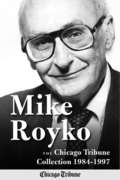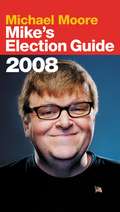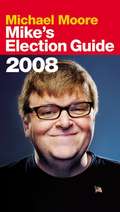- Table View
- List View
Migration, Religion, and Schooling in Liberal Democratic States (Routledge Research in Religion and Education)
by Bruce A. ColletSpeaking to an increasingly fluid world involving the migration of peoples and cultures, the global resilience of religion, and the role of schooling in fostering liberal democratic values, this book investigates the degree to which secular public schools might facilitate religious migrants’ societal integration. Adopting a multidisciplinary approach which draws from political philosophy, the philosophy of education, and the sociology of religion, Collet argues that public schools in liberal democratic states can best facilitate the pluralistic integration of religious migrant students through adopting policies of recognition and accommodation that are not only reasonable in the light of liberal democratic principles, but also informed in terms of what we understand regarding the natural role religion often plays in acculturation.
Migration, Remittances, And Small Business Development: Mexico And Caribbean Basin Countries
by Sidney Weintraub Sergio Díaz-Briquets"The Immigration Reform and Control Act of 1986 (IRCA) was a manifestation of widespread public concern over the volume of undocumented immigration into the United States. The principal innovation of this legislation-the provision to impose penalties on employers who knowingly hire undocumented immigrants-was a response to this concern. This effort at restriction was tempered in IRCA by other provisions permitting the legalization of two types of undocumented immigrantsthose who had resided in the United States since January 1, 1982; and what were called special agricultural workers (SAWs), persons who had worked in perishable crop agriculture for at least 90 days during specified periods from 1983 to 1986. Approximately 3.1 million persons sought legalization (what is popularly referred to as amnesty) under these two provisions. The breakdown was roughly 1.8 million under the regular program and 1.3 million as SAWs. Mexicans made up 75 percent of the combined legalization requests."
Migration, Remittances, and Sustainable Development in Africa (Routledge Studies in Development Economics)
by Maty Konte Linguère Mously MbayeThis book provides a strong multidisciplinary examination of the links between migration, remittances and sustainable development in Africa. It makes evidence-based policy recommendations on migration to help achieve the Sustainable Development Goals. The key themes examined are migration and remittances, and their relations with the following issues: economic transformation, education and knowledge, corruption and conflict. Cross-cutting issues such as gender equality and youth are weaved throughout the chapters, and a rich range of country contexts are presented. The volume also discusses challenges in managing migration flows. It will be of interest to advanced students, academics and policy makers in development economics and sustainable development.
Migration, Security, And Citizenship In The Middle East
by Peter Seeberg Zaid EyadatThis volume addresses new tendencies related to migration from a Middle Eastern and Mediterranean perspective and with an emphasis on security and citizenship. Contributors aim not only to intervene in scholarly debates surrounding citizenship and migration but also to contribute to policy-oriented discussions related to migration.
Migration, Security, and Resistance: Global and Local Perspectives (Routledge Studies in Liberty and Security)
by Graham HudsonThis volume explores the digitization, privatization, and spatial displacement of border security and the effects these have on political accountability and migrant rights. The governance of security and migration is unfolding in new political spaces. Cooperation and competition among immigration officials, border guards, transnational security corporations, IT companies, local police, and international organizations has decoupled migration governance from national political structures. The chapters in the volume examine how these dynamics affect the deployment and constraint of sovereign power in the United States, Canada, the United Kingdom, and the EU. Contributors trace this process from the disciplinary perspectives of law, political science, sociology, criminology, and geography. Part I of the book explores the reconfiguration of security and migration governance through historical processes of privatization, digitization, and the rescaling of border control technologies to local and global spaces. Part II explores how migrant rights actors have responded by rescaling resistance to global and local levels. This book will be of much interest to students of critical security studies, global governance, migration studies, and international relations.
Migration, Temporality, and Capitalism: Entangled Mobilities Across Global Spaces
by Winnie Lem Pauline Gardiner BarberBringing together a range of illustrative case studies coupled with fresh theoretical insights, this volume is one of the first to address the complexities and contradictions in the relationship between migration, time, and capitalism. While temporal reckoning has long fascinated anthropologists, few studies have sought to confront how capitalism fetishizes time in the production of global inequalities—historically and in the contemporary world. As it explores how the agendas of capitalism condition migration in Europe, North America, and Oceania, this collection also examines temporality as a feature of migrants’ experiences to ultimately provide a theoretically robust and ethnographically informed investigation of migration and temporality within a framework defined by the political economy of capitalism.
Migration, Transnational Flows, and the Contested Meanings of Race in Asia (IMISCOE Research Series)
by Shanshan Lan Miloš DebnárThis open access edited volume addresses the multi-layered relations between migration, transnational flows, and the contested meanings of race in Asia. It tries to answer the following questions: how do migration and transnational flows from the Western world impact racial knowledge formation in Asian societies? To what extent do they challenge, perpetuate, and reshape unequal power relations based on the intersection of race, gender, class, nationality, citizenship, and migration status in Asia? How are dominant Western racial categories such as race, whiteness, and blackness redefined and reconstructed in the context of the Covid-19 pandemic, when transnational mobility became both heavily restricted and stigmatized ? The book is divided into three parts: Race, Language and Migration status, Covid-19 and the Dynamics of Racialization, Gender and Interracial Encounters. This book positions itself in the nexus of race, migration and pandemic research and will make a significant contribution to critical race studies, whiteness studies, globalization, multiculturalism, and social transformation in Asia. This book is aimed at students and scholars in race and migration studies in Asia and beyond. This is an open access book.
Migration, Urbanity and Cosmopolitanism in a Globalized World (IMISCOE Research Series)
by Catherine Lejeune Delphine Pagès-El Karoui Camille Schmoll Hélène ThiolletThis open access book draws a theoretically productive triangle between urban studies, theories of cosmopolitanism, and migration studies in a global context. It provides a unique, encompassing and situated view on the various relations between cosmopolitanism and urbanity in the contemporary world. Drawing on a variety of cities in Latin America, Europe, Asia, Africa and North America, it overcomes the Eurocentric bias that has marked debate on cosmopolitanism from its inception. The contributions highlight the crucial role of migrants as actors of urban change and targets of urban policies, thus reconciling empirical and normative approaches to cosmopolitanism. By addressing issues such as cosmopolitanism and urban geographies of power, locations and temporalities of subaltern cosmopolites, political meanings and effects of cosmopolitan practices and discourses in urban contexts, it revisits contemporary debates on superdiversity, urban stratification and local incorporation, and assess the role of migration and mobility in globalization and social change.
Migration, Workers, and Fundamental Freedoms: Pandemic Vulnerabilities and States of Exception in India
by Kalpana Kannabiran Manoranjan Mohanty Asha HansThe COVID-19 pandemic resulted in a mass exodus of India’s migrant workers from the cities back to the villages. This book explores the social conditions and concerns around health, labour, migration, and gender that were thrown up as a result of this forced migration.The book examines the failings of the public health systems and the state response to address the humanitarian crisis which unfolded in the middle of the pandemic. It highlights how the pandemic-lockdown disproportionately affected marginalised social groups – Dalits and the Adivasi communities, women and Muslim workers. The book reflects on the socio-economic vulnerabilities of migrant workers, their rights to dignity, questions around citizenship, and the need for robust systems of democratic and constitutional accountability. The chapters also critically look at the gendered vulnerabilities of women and non-cis persons in both public and private spaces, the exacerbation of social stratification and prejudices, incidents of intimidation by the administration and the police forces, and proposed labour reforms which might create greater insecurities for migrant workers.This important and timely book will be of great interest to researchers and students of sociology, public policy, development studies, gender studies, labour and economics, and law.
Migration, Workers, and Fundamental Freedoms: Pandemic Vulnerabilities and States of Exception in India
by Asha Hans, Kalpana Kannabiran, Manoranjan Mohanty, and PushpendraThe COVID-19 pandemic resulted in a mass exodus of India’s migrant workers from the cities back to the villages. This book explores the social conditions and concerns around health, labour, migration, and gender that were thrown up as a result of this forced migration. The book examines the failings of the public health systems and the state response to address the humanitarian crisis which unfolded in the middle of the pandemic. It highlights how the pandemic-lockdown disproportionately affected marginalised social groups – Dalits and the Adivasi communities, women and Muslim workers. The book reflects on the socio-economic vulnerabilities of migrant workers, their rights to dignity, questions around citizenship, and the need for robust systems of democratic and constitutional accountability. The chapters also critically look at the gendered vulnerabilities of women and non-cis persons in both public and private spaces, the exacerbation of social stratification and prejudices, incidents of intimidation by the administration and the police forces, and proposed labour reforms which might create greater insecurities for migrant workers. This important and timely book will be of great interest to researchers and students of sociology, public policy, development studies, gender studies, labour and economics, and law.
Migration: The Challenge of European States
by Jaroslav MihalikIn the United States as well as in Europe, migration and migration policy are one of the top issues. This timely volume gathers distinguished authors from academic institutions throughout Europe, addressing the growing importance of migration policy making and the refugee crisis that European Union member states and other countries are currently facing. By focusing on the most important effects that the migration from Third World countries has brought to the European Union, they provide a critical overview of the politicization, securitization, and social discourse of migration. The authors analyze the effects on public administration and governance and also discuss the rise of the radical right in EU member states, the rise of populism, and the alienation of citizens from formal politics which is also caused by the growing interest in security and public safety. The pan-European character of the publication’s scope is vested in its narration; the contributors cover the situation in Western Europe, the critical positions of the Visegrad countries as well as foreign policy making in Slovenia and the Western Balkans. Moreover, the authors address case studies from states such as Armenia and Moldova, including their labor migrants in the Western world. The collection is completed by contrasting and discussing the immigration policies of countries that are well-known for their open and liberal immigration activities such as Australia, Canada, New Zealand, and the United States.
Migrations in the Mediterranean: IMISCOE Regional Reader (IMISCOE Research Series)
by Ricard Zapata-Barrero Ibrahim AwadThis open access Regional Reader describes population movement circulating within the Mediterranean area, for any reason or from any region, be them European, African, Asian or originating from any of the Mediterranean shores. It showcases a plurality of approaches to and applications of Mediterranean migration, contributing to a regional approach to migration studies, thereby defending this regional approach by scaling Mediterranean migration issues. This book covers a large set of questions related Mediterranean migrations to the migration research agenda, such as: market and economy, politics and policies, super-diversity and intersectionality, media, society, welfare and the environment through five main parts: Geo-political Mediterranean Relations, Governance, Policies and Politics, Mobility drivers and Agency, Cities, History and Social Transformations, and Economy and Labour Markets. This Regional Reader provides an interesting read to scholars, researchers, but also policy makers and civil society organizations’ high representatives, international foundations and institutions interested in linking the Mediterranean and migration.
Migrations of the Holy: God, State, and the Political Meaning of the Church
by William T. CavanaughWhether one thinks that "religion" continues to fade or has made a comeback in the contemporary world, there is a common notion that "religion" went away somewhere, at least in the West. But William Cavanaugh argues that religious fervor never left -- it has only migrated toward a new object of worship. In Migrations of the Holy he examines the disconcerting modern transfer of sacred devotion from the church to the nation-state. In these chapters Cavanaugh cautions readers to be wary of a rigid separation of religion and politics that boxes in the church and sends citizens instead to the state for hope, comfort, and salvation as they navigate the risks and pains of mortal life. When nationality becomes the primary source of identity and belonging, he warns, the state becomes the god and idol of its own religion, the language of nationalism becomes a liturgy, and devotees willingly sacrifice their lives to serve and defend their country. Cavanaugh urges Christians to resist this form of idolatry, to unthink the inevitability of the nation-state and its dreary party politics, to embrace radical forms of political pluralism that privilege local communities -- and to cling to an incarnational theology that weaves itself seamlessly and tangibly into all aspects of daily life and culture.
Migrations, Arts and Postcoloniality in the Mediterranean (Routledge Focus on Art History and Visual Studies)
by Celeste IannicielloThis book is focused on the transcultural memory of the Mediterranean region and the different ways it is articulated by contemporary art practices and museum projects linked to migrations, exile, diaspora and transnationality. The artistic and curatorial examples analysed in this study articulate a critical relationship between the cultural representations and the sense of heritage, property and belonging, offering the opportunity of a more problematic and stimulating vision of the preservation of the European arts, traditions and histories. Artists and projects examined include the project Porto M in Lampedusa, Zineb Sedira, Ursula Biemann, Lara Baladi, Mona Hatoum, Emily Jacir, Kader Attia and Walid Raad.
Migrations, Identities and Democratic Practices in India
by Samir Kumar DasThis book explores contesting identities, international politics, migration and democratic practices in the context of globalizing India. Drawing on extensive ethnographic research, it looks at one of the oldest migratory routes across a volatile region in eastern India which is fraught with violent claims of separate statehood. The book offers an account of how the ‘North Bengal’ region has acted as a gateway to migrant populations over time and points to why it must be understood as a shifting and liminal space through a study of Bodoland, Gorkhaland, Kamatapuri, Siliguri and the Greater Cooch Behar movements. It shows the region’s politics of identity or quest for homeland not as a means of compensating for the lack or absence of identity, but as an everyday practice of living that very absence, across borders and boundaries, without arriving at any definitive and stable identity, along with impacts and manifestations in democratic political processes. A major intervention in modern political theory – shedding new light on concepts such as home and homeland, space and self, sovereignty, nation-state, freedom and democracy – this book will be of interest to scholars and researchers of political science, modern South Asian history, sociology and social anthropology, and migration and diaspora studies.
Migrationsgesellschaftliche Diskriminierungsverhältnisse in Bildungssettings: Analysen, Reflexionen, Kritik
by Paul Mecheril Susanne Bücken Noelia Streicher Astride VelhoDass in pädagogischen Zusammenhängen nicht nur das Thema Diskriminierung zum Gegenstand werden kann, sondern pädagogische Settings selbst Orte der Diskriminierung sein können, stellt den Bezugspunkt des vorliegenden Bandes dar. Mit Bezug auf diese gewissermaßen Verdopplung des Themas Diskriminierung in pädagogischen Settings werden in dem Sammelband Komplexitäten, Widersprüchlichkeiten und Verstrickungen, welche grundlegende Spannungsverhältnisse der kritischen Thematisierung migrationsgesellschaftlicher Diskriminierung betreffen, analysiert und reflektiert. Die Beiträge wenden sich dabei unterschiedlichen pädagogischen Bereichen zu.
Miguel Enríquez: Un nombre en las estrellas. Biografía de un revolucionario
by Mario AmorósEsta es la biografía del revolucionario que simboliza la Resistencia heroica frente a la dictadura en el momento más duro, cuando la DINA operaba con absoluta impunidad y crueldad, cuando el terror paralizaba a la sociedad chilena. Miguel Enríquez (Talcahuano, 1944), hijo de una ilustre familia de Concepción, médico, fue el líder del Movimiento de Izquierda Revolucionaria desde 1967 hasta su asesinato en aquel combate desigual de la calle Santa Fe el 5 de octubre de 1974. Con su liderazgo, y acompañado por una nueva generación de dirigentes y militantes, el MIR marcó una ruptura en la política nacional. Apoyó críticamente al Gobierno de Salvador Allende, movilizó a "los pobres del campo y la ciudad" por el poder popular, denunció la conspiración de la derecha y, después del golpe de Estado, fue golpeado terriblemente por la represión. A partir de abundante documentación inédita y de los testimonios de sus familiares y compañeros, Mario Amorós relata de manera acuciosa la apasionante trayectoria de Miguel Enríquez. Solo vivió 30 años, pero su nombre quedó grabado en la Historia y en la Memoria popular de Chile y de América Latina.
Mike
by Rt. Hon. Pearson Rt. Hon. ChretienOne of Canada's most dynamic prime ministers, Lester B. Pearson lived a life which took him from a childhood in rural Ontario to the apex of international politics. In the second volume of his memoirs, he provides a first-person account of the busy and challenging decade that followed his entry into politics in 1948.This volume, completed after Pearson's death under the supervision of his son Geoffrey, recounts his involvement in Canadian politics and diplomacy as a MP and Secretary of State for External Affairs during the early years of the Cold War. It offers his perspective on issues such as the formation of NATO, Canada's involvement in the Korean War, and the diplomacy that ended the Suez Crisis and earned Pearson the Nobel Peace Prize in 1957. Two appendices, taken from his diaries, show him hard at work at the United Nations during the Korean crisis.Mike captures Pearson's intellect, his sense of humour, and his humanity, offering an inside look at the moments that shaped the twentieth century. This new edition features a foreword by Pearson cabinet minister and former prime minister Jean Chrétien.
Mike
by Rt. Hon. Pearson Rt. Hon. ChretienOne of Canada's most dynamic prime ministers, Lester B. Pearson lived a life which took him from a childhood in rural Ontario to the apex of international politics. This third and final volume of his memoirs follows him from his years of triumph as a Canadian diplomat to his retirement from politics and the passing of the Liberal torch to Pierre Elliott Trudeau.Completed after Pearson's death under the supervision of his son Geoffrey, this volume of Mike covers Pearson's election as leader of the Liberal Party, his years in opposition to the Diefenbaker government, and his achievements as prime minister: a list that included the establishment of the Canada Pension Plan, universal medicare, the Auto Pact, and a new Canadian flag.Mike captures Pearson's intellect, his sense of humour, and his humanity, offering an inside look at the decisions that shaped Canada in the twentieth century. This new edition features a foreword by Pearson cabinet minister and former prime minister Jean Chrétien.
Mike
by Rt. Hon. Cretien Rt. Hon. PearsonOne of Canada's most dynamic prime ministers, Lester B. Pearson lived a life which took him from a childhood in rural Ontario to the apex of international politics. The first volume of his memoirs follows him from his youth as the son of a Methodist preacher to his decision to enter politics in 1948.In this volume of Mike, Pearson recalls his university years at the University of Toronto and St. John's College, Oxford, his military service in the First World War, and his return to the University of Toronto in 1923 to teach history and, in his spare time, coach football and hockey. In 1928, Pearson joined the Department of External Affairs, rapidly rising through the ranks to become ambassador to the United States by 1945.Mike captures Pearson's intellect, his sense of humour, and his humanity, offering a charming look at the youth of a great statesman. This new edition features a foreword by Pearson cabinet minister and former prime minister Jean Chrétien.
Mike Bloomberg: Money, Power, Politics
by Joyce PurnickMichael Bloomberg is not only New York City’s 108th mayor; he is a business genius and self-made billionaire. He has run the toughest city in America with an independence and show of ego that first brought him great success-and eventually threatened it. Yet while Bloomberg is internationally known and admired, few people know the man behind the carefully crafted public persona. In Mike Bloomberg, Joyce Purnick explores Mr. Bloomberg’s life from his childhood in the suburbs of Boston, to his rise on Wall Street and the creation of Bloomberg L. P. , to his mayoral record and controversial gamble on a third term. Drawing on her deep knowledge of New York City politics, and interviews with Bloomberg’s friends, family, colleagues, and the mayor himself, she creates a textured portrait of one of the more complex men of our era.
Mike Mansfield, Majority Leader: A Different Kind of Senate, 1961-76
by Francis R. ValeoThe story of Mike Mansfield's influential fifteen-year reign as Senate Majority Leader is colored with some of the most important events of this century: the election of John F. Kennedy, the Kennedy and King assassinations, student and political unrest of the late Sixties, Vietnam, Watergate, the Nixon resignation, and numerous important pieces of legislation from the era, among them the 1964 Civil Rights Act. Valeo, Secretary of the Senate under Mansfield, writes about the Senate and Mansfield's role in national affairs from 1961-76. He argues that Mansfield was instrumental in shaping a more egalitarian kind of Senate than that of the 1950s, when Lyndon B. Johnson was Majority Leader.
Mike Royko: The Chicago Tribune Collection 1984-1997
by Mike Royko John Kass Chicago Tribune StaffMike Royko: The Chicago Tribune Collection 1984-1997 is an expansive new volume of the longtime Chicago news legend's work. Encompassing thousands of his columns, all of which originally appeared in the Chicago Tribune, this is the first collection of Royko work to solely cover his time at the Tribune. Covering politics, culture, sports, and more, Royko brings his trademark sarcasm and cantankerous wit to a complete compendium of his last 14 years as a newspaper man.Organized chronologically, these columns display Royko's talent for crafting fictional conversations that reveal the truth of the small-minded in our society. From cagey political points to hysterical take-downs of "meatball" sports fans, Royko's writing was beloved and anticipated anxiously by his fans. In plain language, he "tells it like it is" on subjects relevant to modern society. In addition to his columns, the book features Royko's obituary and articles written about him after his death, telling the tale of his life and success.This ultimate collection is a must-read for Royko fans, longtime Chicago Tribune readers, and Chicagoans who love the city's rich history of dedicated and insightful journalism.
Mike's Election Guide
by Michael MooreIn his first book in five years, Michael Moore brings us the definitive guide to the 2008 election. After a diastrous war, the failure to catch bin Laden, millions of families who have lost their homes, the Katrina debacle, soaring gas prices feeding record oil company profits, and the largest national debt caused by the biggest spending and borrowing administration in American history, the country has had it with conservatives, right-wingers and Republicans. A thrilling election season is now upon us. Obama vs. McCain. One candidate has promised a presidency different from any other, one that will take us forward to embrace the hope of the 21st century. The other candidate says he has no idea how to use a computer. Welcome to MIKE'S ELECTION GUIDE -- Michael Moore's effort to make sense of the this fall's race for the White House and Congress. In it, Moore answers the nation's most pressing questions: "Why is John McCain so angry?," "Do the Democrats Still Drink from a Sippy Cup and Sleep with the Light On?," Can I get into the Electoral College with only a 2.0 gpa?" and "How many Democrats does it take to lose the most winnable election in American history?" It's a great year to be an American and a voter. Don't miss out on all the fun! And don't miss out on MIKE'S ELECTION GUIDE -- it's the indispensable book that belongs in every American's back pocket this season.
Mike's Election Guide 2008
by Michael MooreHow to elect John McCain, or how many Democrats does it take to lose the most winnable election in American history? Moore's hilarious comments and insights on the 2008 election.
